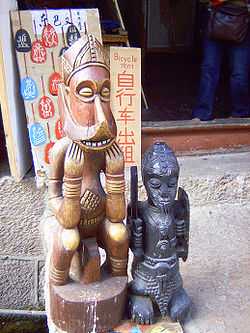Dongba


The term Dongba (²dto¹mba) refers to the religious priests, the culture, and script of the Nakhi people, who are found in southwestern China.
Religion
The Dongba, also known as wise men, are believed to be the priests of the Bön religion. They play a major role in the Naxi culture, and preach harmony between man and nature. Their costumes show strong Tibetan influence, and pictures of Bön gods can be seen on their headgear. Tibetan prayer flags and Taoist offerings can be seen in their rituals.
Religious rituals are also conducted by the priests to propitiate the spirits, as they were believed to be living in every part of the natural world.
The core of the Dongba religion is based on the belief that both man and nature are two half-brothers born of two mothers and the same father. This creates revenge from heaven, which befalls upon humans who use up too much natural resources.
Prior to Bön influence, it is suggested that the original priests were the female Llü-bu. At that time, statues or religious images could be widely seen everywhere.
A Complete Annotated Translation of Ancient Nakhi Dongba Books (纳西东巴古籍译注全集), in 100 volumes, has been published[1][2]
Notes
See also
| Wikimedia Commons has media related to Dongbaism in China. |
- Dongba script
External links
- Dongba culture related art
- A series of Dongba Culture artworks by Dongba ethnic artist Cun Liusan.
- Edongba Input Dongba hieroglyphs and Geba symbols.